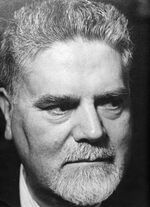
Giovanni Gentile (30 May 1875 – 15 April 1944) was an Italian philosopher, educator, and fascist politician. He helped to provide the intellectual foundation for Italian fascism, and ghostwrote part of The Doctrine of Fascism (1932) with Benito Mussolini.
Biography[]
Giovanni Gentile was born in Castelvetrano, Sicily in 1875, and he graduated from the Scuola Normale Superiore di Pisa in 1897, subsequently meeting Benedetto Croce, whith whom he formed a close intellectual partnership. He taught at the University of Naples from 1903 and began to publish for Croce's review, La critica. By 1907, he had begun to formulate his idealist philosophical position which he subsequently elaborated with work on critical philosophy. In 1914, he became professor of theoretical philosophy at Pisa, and in 1917 he moved to the University of Rome. In marked contrast of Croce, he became a careful supporter of Benito Mussolini and joined his first government as Education Minister from 1922 to 1924. There, he carried out an educational reform which introduced religious teaching in primary schools, state examinations for teachers and pupils, as well as separate middle schools for technology and the humanities. He resigned over the murder of Giacomo Matteotti. In 1925, he became general editor of the Enciclopedia Italiana, in which he, rather controversially, sought to give a scholarly and conclusive definitive definition of fascism (this article was signed by Mussolini himself, pretending to be its author). In 1925, he joined a Manifesto of Fascist Intellectuals in support of Mussolini, and subsequently he repeated his public support for him, even following his proclamation of the Salo Republic. In 1944, he was captured by anti-fascist Italian Partisans as he returned from Florence, where he had been arguing for the release of anti-fascist intellectuals. He was executed on 14 April.
